Key Takeaways
- Naphthalene balls (mothballs) provide only temporary relief from cockroach infestations and pose health risks to humans and pets.
- Cockroaches breed rapidly, making short-term solutions ineffective.
- Understanding cockroach biology (egg, nymph, adult stages) highlights the need for comprehensive pest management strategies.
- Safer alternatives like boric acid, diatomaceous earth, and natural repellents offer long-term cockroach control without health hazards.
- Preventive actions, including cleanliness, exclusion, and proper waste management, are key to keeping cockroaches away permanently.
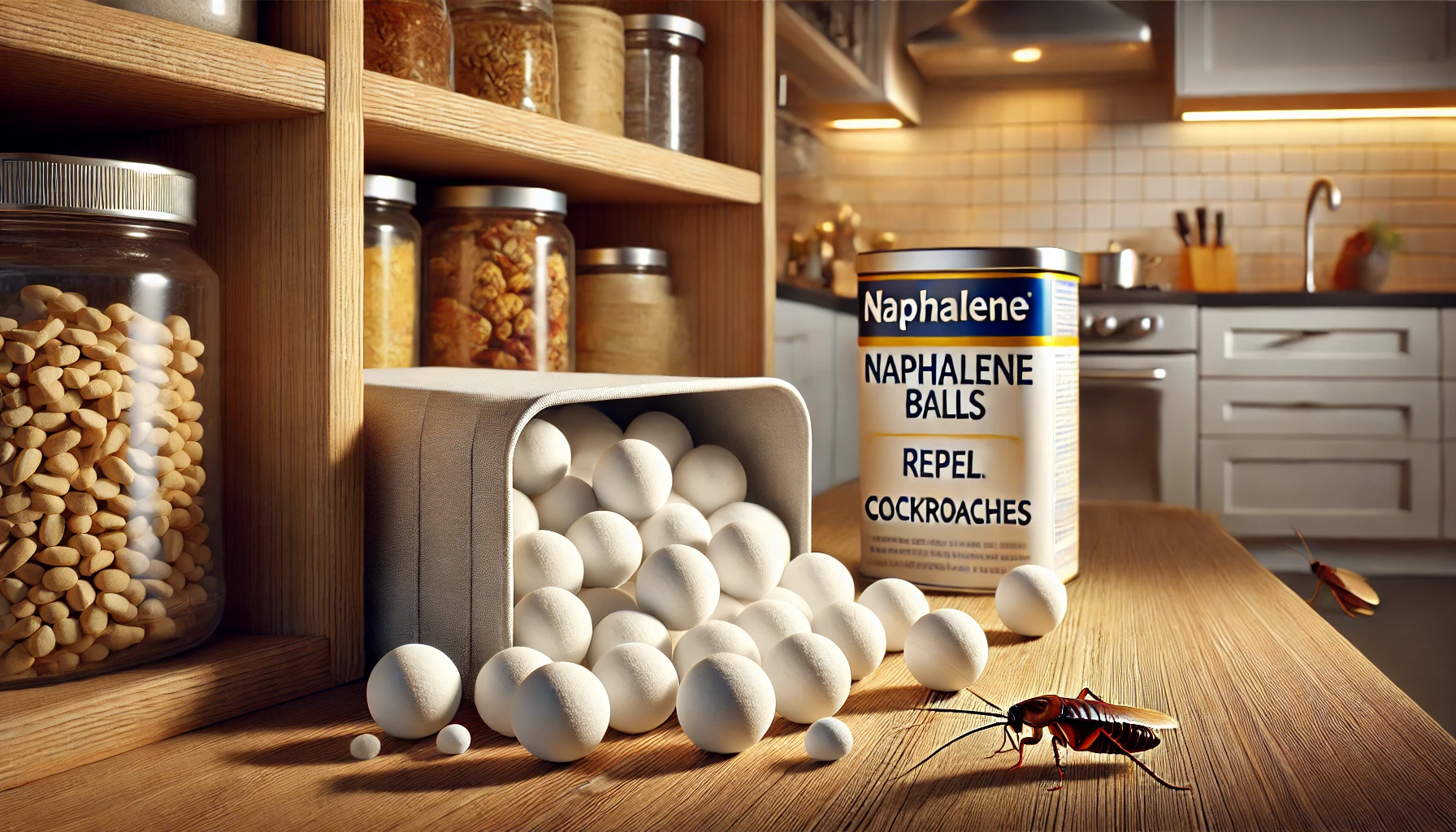 Cockroaches can be frustrating and challenging for many US households at one point. Often, homeowners turn to traditional treatments, like naphthalene balls (commonly known as mothballs), to combat infestations. But are mothballs genuinely effective against cockroaches?
Cockroaches can be frustrating and challenging for many US households at one point. Often, homeowners turn to traditional treatments, like naphthalene balls (commonly known as mothballs), to combat infestations. But are mothballs genuinely effective against cockroaches?
Understanding cockroach biology, including their lifecycle and reproduction, can help homeowners make informed pest control decisions.
Can Naphthalene Balls Repel Cockroaches?
Naphthalene balls contain either naphthalene or paradichlorobenzene, substances known to emit strong odors designed to repel pests such as moths and insects. The strong smell of mothballs is indeed despised by cockroaches, and they have a tendency to avoid such areas where mothballs are placed. However, it’s essential to clarify that naphthalene balls do not eliminate cockroach infestations—they merely repel cockroaches temporarily.Cockroaches are highly adaptable, allowing them to circumvent the presence of mothballs by moving to unaffected areas of your home. As naphthalene balls evaporate or lose potency over time, cockroaches may gradually return if conditions that initially attracted them (such as moisture, food sources, or shelter) remain unchanged.
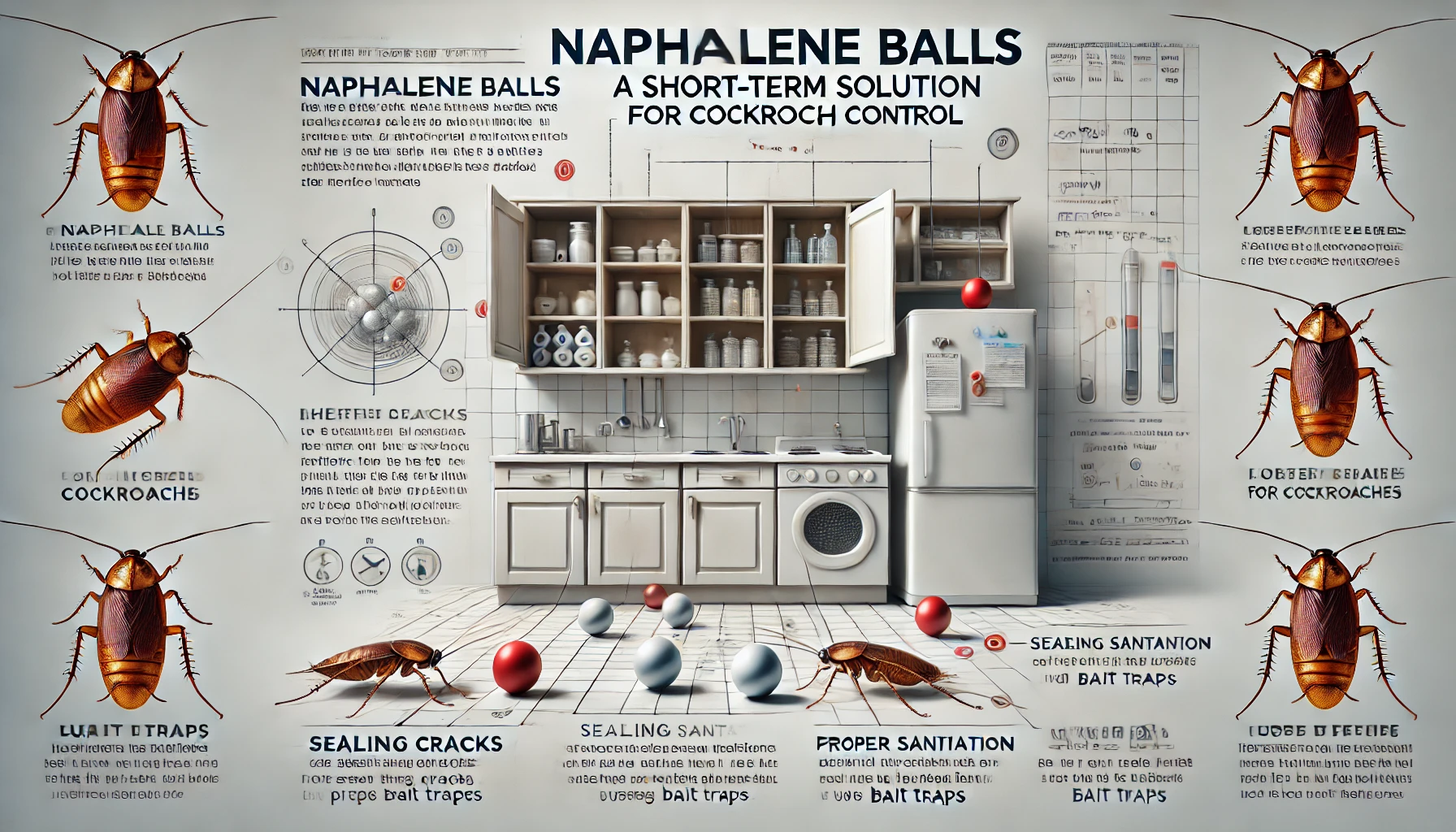

Not getting a solution?
Get your free pest control estimate today!Why Naphthalene Balls Are Only a Short-Term Solution
- Cockroaches are flexible creatures who are capable of quickly altering their behaviour according to the situation to avoid repellents. Here’s why mothballs alone can’t offer a perfect and sustainable solution:
-
Limited Reach: Mothballs emit gases effective in closed spaces, but cockroaches often hide in inaccessible areas like walls, floorboards, and plumbing where the fumes cannot reach.
-
Ineffective Against Eggs and Nymphs: Mothballs may temporarily repel adult roaches, but they do nothing to eliminate cockroach eggs (oothecae) or young nymphs hiding in cracks and crevices.
-
Hazardous to Health: Naphthalene fumes pose health risks, especially to children and pets, causing respiratory problems, nausea, and dizziness with prolonged exposure.
Understanding Cockroach Lifecycle and Reproduction
To effectively have a control over cockroaches, it’s important to understand their lifecycle and reproduction patterns. The rapid growth of reproductive rates of cockroaches can escalate a smaller infestation into a major crisis within a short span of time.Cockroach Life Cycle
- Cockroaches go through three main stages in their life cycle:
-
Egg Stage (Ootheca): Female cockroaches lay eggs enclosed in protective cases called oothecae. Each ootheca can contain anywhere from 15 to 50 eggs, depending on the species. German cockroaches typically produce 30-40 eggs per ootheca, while American cockroaches produce around 14-16 eggs per case.
-
Nymph Stage: Once hatched, young cockroaches (nymphs) resemble smaller, wingless versions of adults. They undergo several molts, shedding their exoskeleton multiple times before reaching adulthood. This stage lasts anywhere from two to six months, depending on species and environmental conditions.
-
Adult Stage: Upon reaching adulthood, cockroaches become capable of reproduction. Adult females lay numerous egg cases throughout their lifespan, contributing to rapid population growth. A single female German cockroach can produce over 200 offspring in her lifetime.
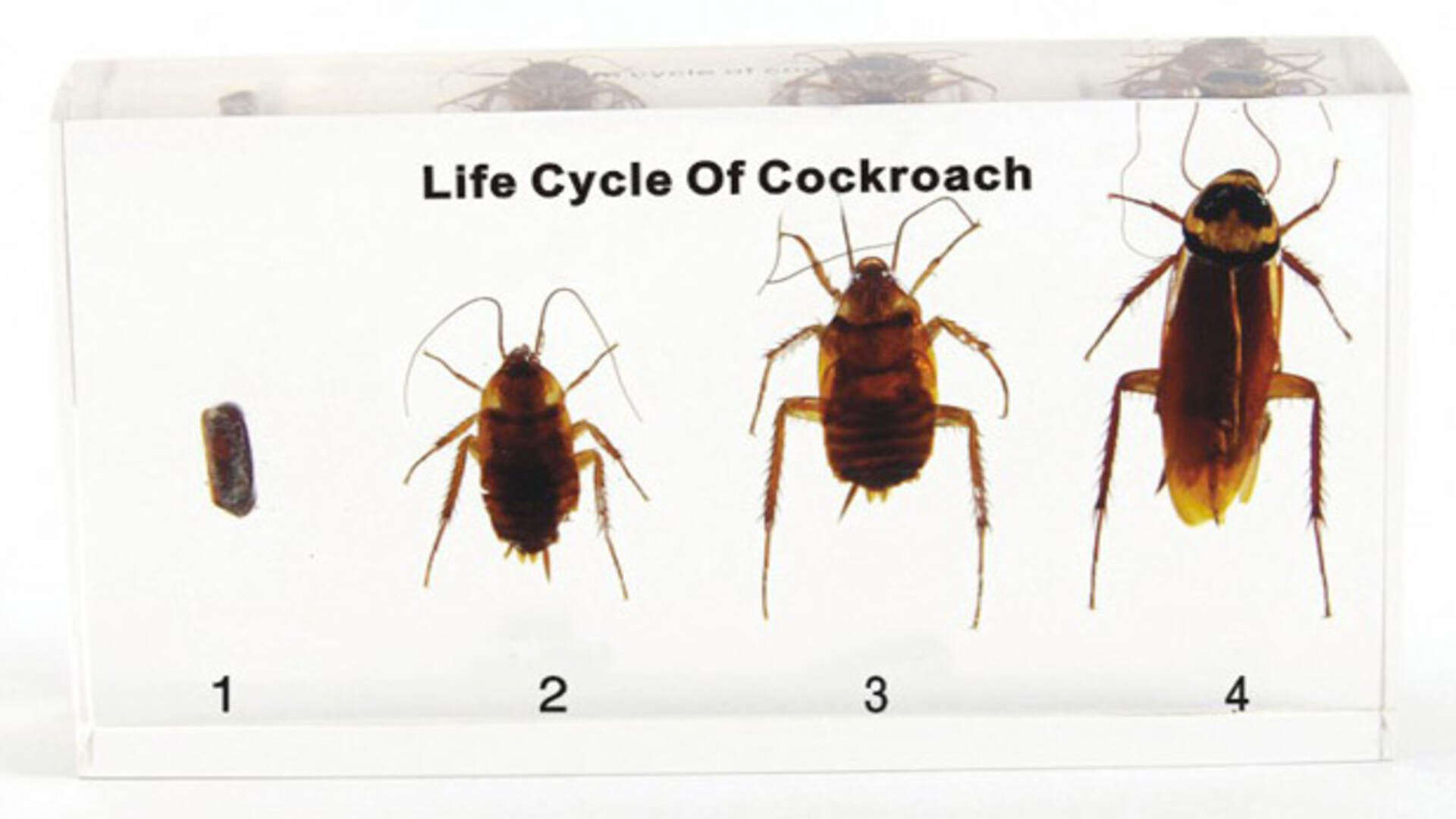
Cockroach Reproduction Rate
- Understanding the cockroach reproduction rate tells us about the urgency of addressing these infestations promptly. For example:
-
German Cockroaches: Mature in about three months and can produce multiple egg cases throughout their lifespan, each containing approximately 30-40 eggs. A single pair of German cockroaches can result in thousands of offspring within one year.
-
American Cockroaches: Although they mature more slowly, American cockroaches have a longer lifespan and lay several egg cases, each containing around 14-16 eggs, leading to steady population growth.
Safer, More Effective Alternatives to Control Cockroaches
For lasting control of cockroaches, homeowners must consider methods that are both safe and effective. These approaches include combining physical, chemical, and preventive strategies:Chemical Methods
-
Boric Acid: A highly effective, low-toxicity powder that cockroaches ingest while grooming. It disrupts their digestive systems and eventually kills them. Apply boric acid lightly in cracks, behind appliances, and under cabinets.
-
Diatomaceous Earth (DE): This natural powder damages cockroach exoskeletons, causing dehydration and death. It’s safe around pets and humans if handled correctly.
-
Cockroach Baits and Traps: Commercial gel baits attract roaches, which ingest poison and carry it back to the colony, effectively eliminating entire populations, including hidden roaches and nymphs.
Natural Repellents
- Several natural substances also help deter cockroaches safely:
-
Essential Oils: Peppermint, eucalyptus, and rosemary oils are excellent repellents that cockroaches actively avoid. Regularly spraying these diluted oils around the home can keep cockroaches away without toxic risks.
-
Baking Soda and Sugar Mixture: This combination acts as an effective bait that roaches consume, resulting in internal reactions that kill them without posing threats to humans or pets.
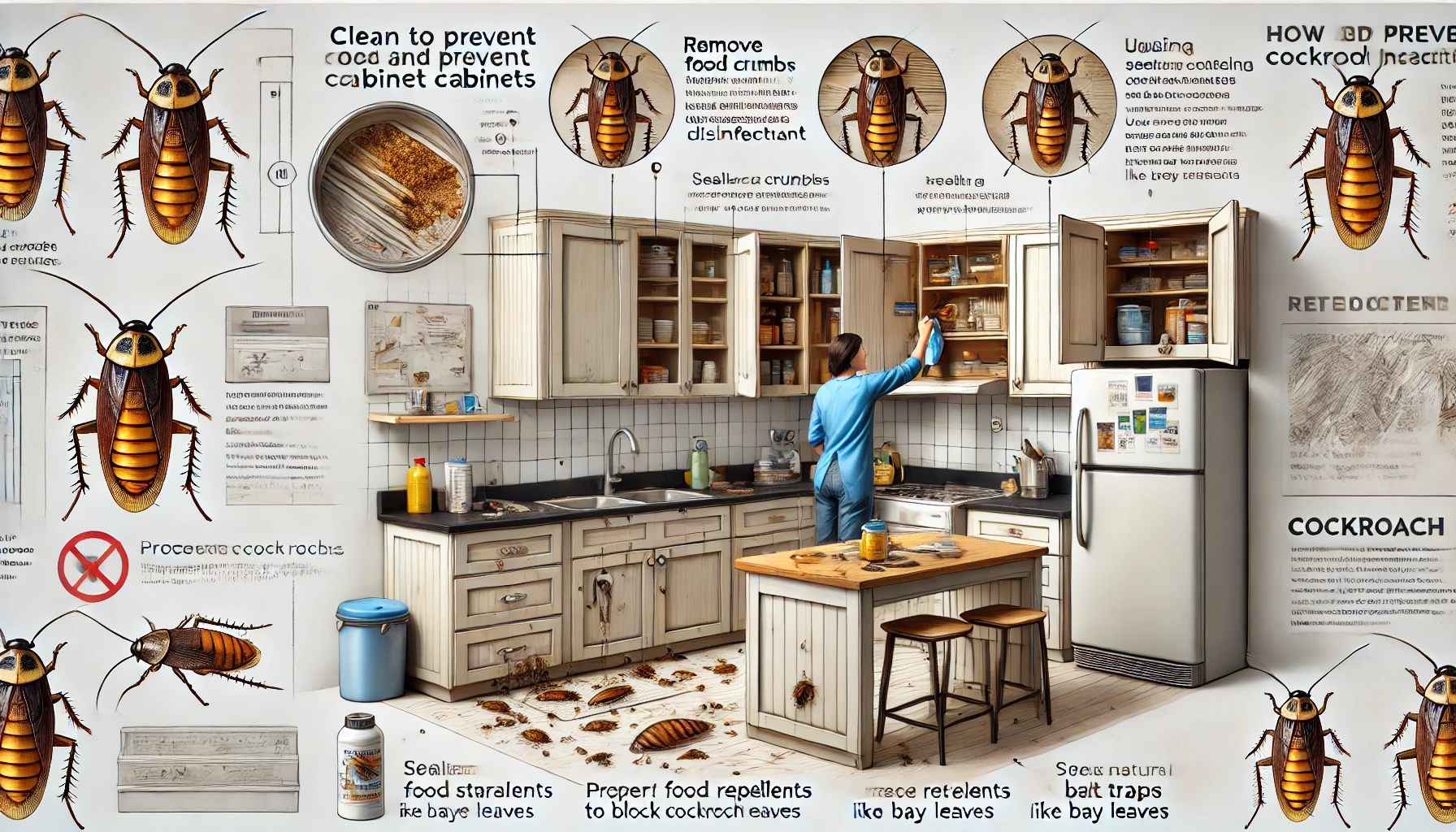
Preventive Measures for Long-term Cockroach Control
- Integrating preventive practices significantly reduces the risk of cockroach infestations:
-
Clean Regularly: Maintain cleanliness by sweeping, mopping, and removing crumbs. Wash dishes promptly and store food in sealed containers to prevent attracting cockroaches.
-
Manage Moisture: Fix leaks, eliminate standing water, and reduce humidity levels, as cockroaches rely on water sources for survival.
-
Eliminate Entry Points: Seal cracks, holes, and gaps around pipes, baseboards, doors, and windows. Proper exclusion techniques significantly reduce cockroach infestations.
-
Proper Waste Management: Dispose of garbage regularly and ensure waste bins are tightly sealed and clean to prevent attracting cockroaches.
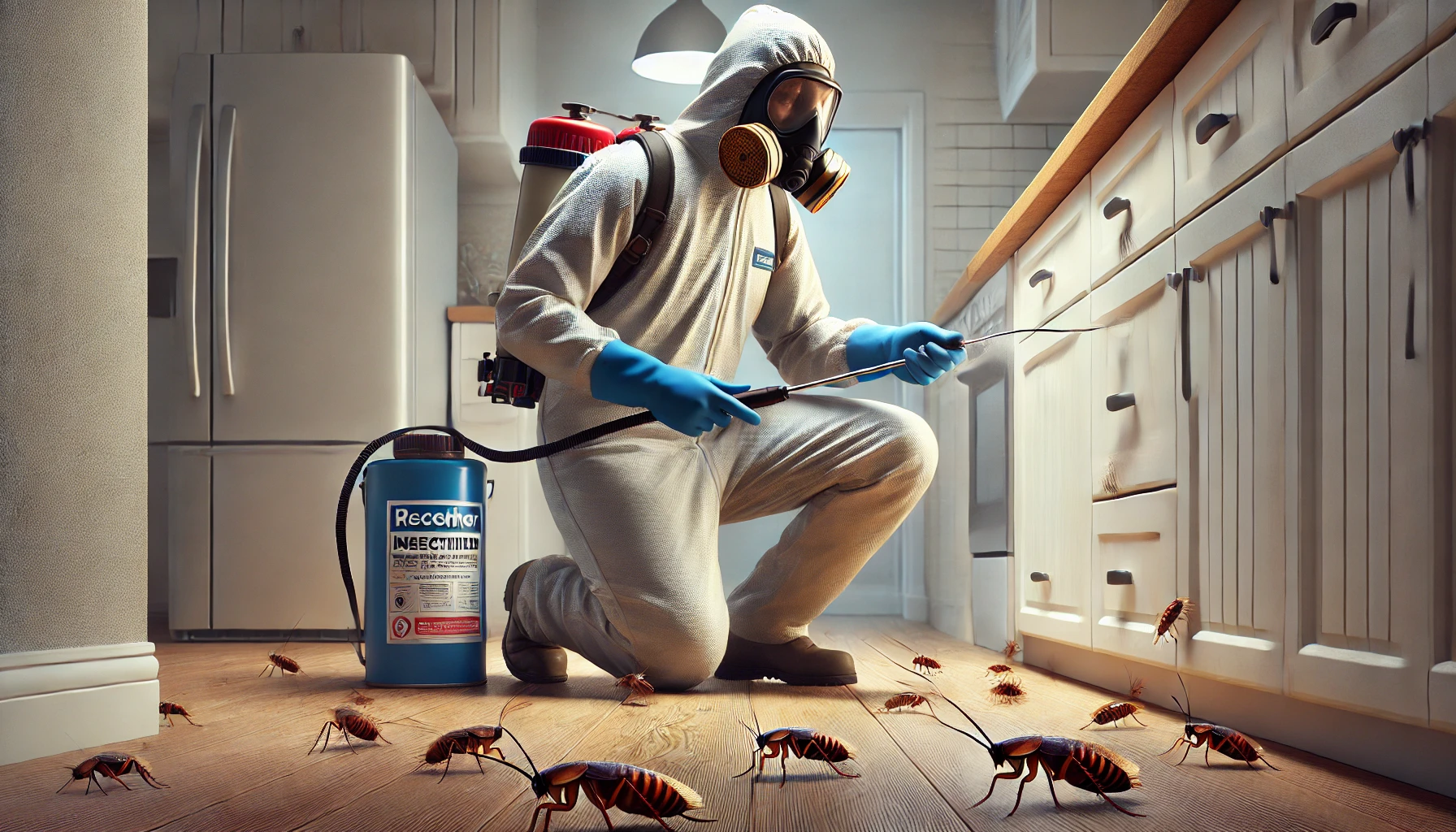 If you feel things have gone out of control, it is advised to contact pest control professionals. Our team can provide a customized approach to protect your home effectively.
If you feel things have gone out of control, it is advised to contact pest control professionals. Our team can provide a customized approach to protect your home effectively.
Visit our Species, Control, and DIY Guide sections for additional resources on cockroaches and ways to tackle a cockroaches infestation.





